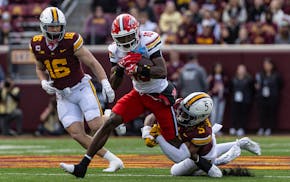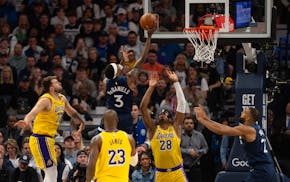Before we get too wrapped up with Joe Mauer's strikeout pace — basically one per game, far above his career average — let's take a step back and acknowledge an amazing 15-game stretch that we might not see from Mauer again. During a 15-game stretch starting April 30 against Detroit and ending Saturday against Boston, Mauer had:
• At least one hit in every game, giving him a 15-game hitting streak. That was one short of his career-long streak of 16. He has 11 career double-digit hitting streaks, it should be noted — including two this season.
• At least one strikeout in every game. So yes, he had at least one hit and one strikeout in 15 consecutive games. He fanned three more times Sunday to make it 16 consecutive games. The longest strikeout streak of his career before that? Six consecutive games.
• His batting average at the start of the streak was .289; after the final game of the streak, it was .351. His on-base percentage went from .360 to .430. His slugging percentage went from .411 to .503.
• His batting average during the streak was .443, which is impressive enough. But his batting average on balls in play was an astounding .659 (27-for-41). Basically two of every three times Mauer put the ball in play during the streak, he got a hit. His career BABIP is .348. This year, entering Monday, it was almost 100 points higher (.447). That suggests an element of luck, but also that Mauer is hitting the ball with authority (particularly during the streak).
• He didn't homer during the streak, but he did have 12 doubles, helping him to a .639 slugging percentage in those 15 games (for perspective, he slugged .587 during his MVP year in 2009). Despite hitting for pop, Mauer had only five runs batted in during his streak. As a result, it was wasted in some ways. The Twins, after all, only went 6-9 in those 15 games despite having their best hitter about as hot as he gets.
• Mauer grounded into zero double plays during the streak and entered Monday with just one GIDP this season after 23 a year ago. The optimist says it's because he's hitting more line drives and swinging with authority. The pessimist says he's not batting enough with men on base to hit into DPs.
MICHAEL RAND

Vikings select Maryland receiver Tai Felton in the NFL draft's third round

Lewis' 2025 season begins with six innings — and a delayed double — for the St. Paul Saints

